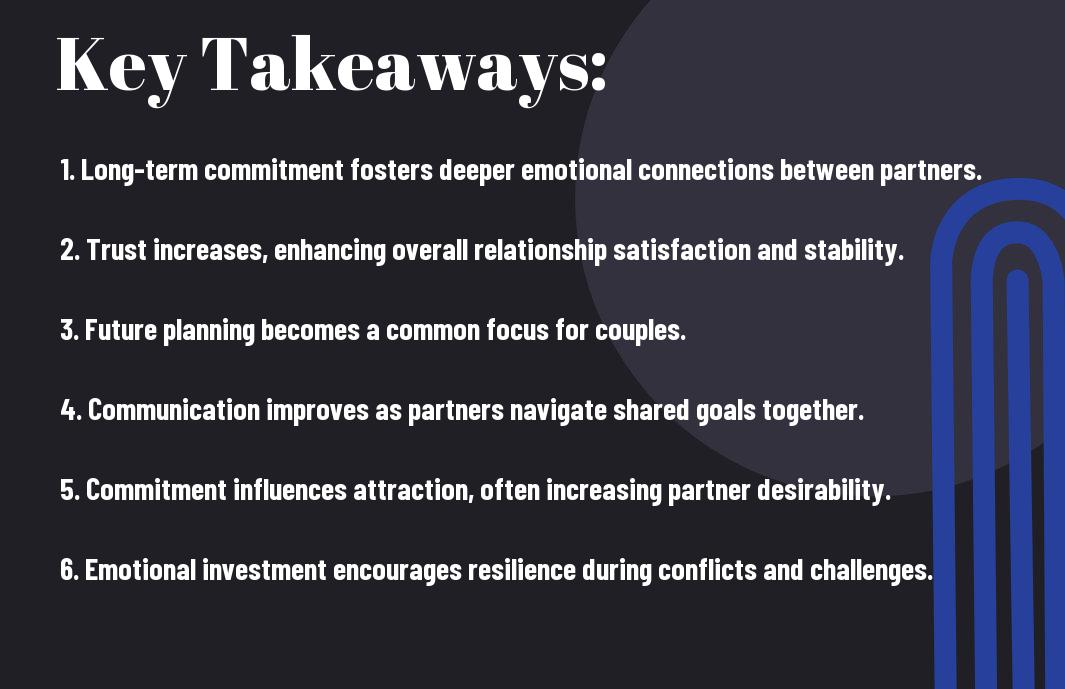Commitment plays a pivotal role in shaping the landscape of modern dating. As you navigate through relationships, understanding the impact of long-term commitment can enhance your experiences. It not only fosters emotional security but also influences your partner’s expectations and behaviors. While a deep commitment can strengthen bonds and lead to meaningful connections, it can also introduce challenges such as pressure and unrealistic standards. In this blog post, we will explore how your approach to commitment can transform dating dynamics, guiding you towards healthier, more fulfilling relationships.
Key Takeaways:
- Long-term commitment often shifts the focus from short-term attraction to deeper emotional connection, impacting how individuals approach dating.
- People in long-term commitments may prioritize compatibility and shared values over physical attraction, leading to more meaningful relationships.
- Long-term commitment can create a framework for communication and conflict resolution, which influences how individuals navigate dating dynamics and build trust.

Understanding Long-Term Commitment
The concept of long-term commitment plays a vital role in today’s dating landscape. It encompasses the emotional and relational investment individuals make in a partner over an extended period. Recognizing how this commitment shapes the dynamics of relationships can provide insight into expectations, stability, and emotional support, ultimately impacting your dating choices.
Definition and Importance
Behind the term “long-term commitment” lies a deep relationship foundation characterized by dedication and mutual respect. This type of relationship promotes personal growth and stability, allowing both partners to navigate life’s challenges together. It’s necessary as it sets the stage for emotional security, fostering trust and deeper connections in your romantic life.
Psychological Factors Involved
Between emotional attachment and cognitive dissonance, long-term commitment is influenced by several psychological factors that shape your relationship dynamics. Key factors include:
- Attachment styles
- Trust and security
- Shared goals
- Communication patterns
Perceiving these dynamics helps you understand not only your behavior but also your partner’s, paving the way for a healthier relationship.
Hence, understanding the psychological factors involved in long-term commitment can significantly enhance your dating experience. Consider how these aspects impact your connections, including:
- Emotional bonding
- Conflict resolution
- Influence of past relationships
- Self-esteem impacts
Perceiving these elements allows you to cultivate stronger, more fulfilling relationships while navigating the complexities of long-term commitment.
Evolution of Dating Dynamics
If you look at the progression of dating, you’ll notice how long-term commitment has significantly influenced the ways in which individuals connect and form relationships. Initially, dating was often seen as a pathway to marriage, and the norms surrounding commitment were strict. Today, the dynamics have transformed, affected by cultural shifts, technology, and changing societal views on relationships.
Historical Perspectives on Commitment
For centuries, dating and relationships were seldom about personal choice; rather, they were influenced by familial expectations and societal norms. In many cultures, arranged marriages were the standard, and commitment was often seen as a necessity rather than a choice. This historical context shaped how commitment was perceived and prioritized within relationships.
Modern Trends in Dating
Evolution in dating trends has led to a more relaxed approach to commitment, with many valuing freedom and flexibility over traditional norms. People increasingly engage in casual dating, often prioritizing personal growth and exploration over the rush to settle down. As technology fosters connections through dating apps and social media, the idea of long-term commitment is evolving into a more complex and negotiable aspect of relationships.
With the rise of online dating and changing societal expectations, you now navigate a landscape where immediate connections are often prioritized over long-term commitments. This shift presents both opportunities and challenges. While the variety of options can enhance your dating experience, it can also contribute to feelings of uncertainty and the fear of missing out on a potential long-term partner. Understanding these modern dynamics can help you make informed choices about your own dating journey.
Impact of Long-Term Commitment on Relationships
Many individuals find that long-term commitment fundamentally shapes their relationship dynamics. It often fosters deeper emotional connections and increases overall satisfaction. Couples become more resilient and able to navigate challenges together. In this Modern Love: How Relationship Dynamics and Expectations … era, understanding these influences becomes imperative for building lasting partnerships.
Emotional Bonding and Trust
Around long-term commitments, emotional bonding and trust significantly deepen between partners. This strong foundation allows you to rely on each other, enhancing intimacy and vulnerability. It creates a safe space for open communication, enabling you to express your feelings and concerns, ultimately leading to a more fulfilling relationship.
Challenges and Conflicts
Challenges are inevitable in any long-term relationship. When familiarity breeds contempt, small irritations can turn into major conflicts, affecting your emotional connection. It’s important to openly discuss your feelings and collaborate on solutions to strengthen your bond rather than let misunderstandings linger.
Conflicts can often stem from unmet expectations, differing priorities, or life stressors. While disagreements are normal, ignoring issues can escalate tension and lead to resentment. Conversely, addressing them directly can turn challenges into opportunities for growth and understanding. Maintain a positive mindset and be willing to compromise, as this approach will help you navigate through challenges, ultimately strengthening your emotional bond. Being proactive in conflict resolution can enhance your trust and foster a healthier relationship dynamic.

Gender Differences in Commitment Perceptions
All perceptions of commitment vary significantly between genders, influencing how each partner approaches dating dynamics. Men often view long-term commitments as a path to stability but may feel pressure to maintain autonomy, while women typically associate commitment with emotional connection and security. Understanding these differences can help navigate the complexities of dating and foster more meaningful interactions.
Male vs. Female Perspectives
Any discussion about commitment must acknowledge the distinct perspectives held by men and women. Generally, men may prioritize personal goals and independence, whereas women often seek emotional connection and stability within relationships. Recognizing these differing priorities can help you align your expectations and improve communication in your dating experiences.
Societal Influences on Commitment
Among the many factors that affect commitment perceptions, societal influences play a significant role. Cultural norms and expectations shape how you view relationships, affecting your readiness for long-term commitments. In many societies, there are pressures to conform to traditional roles, which can hinder genuine connection and understanding in modern dating. Additionally, media representation often glamorizes fleeting relationships over lasting ones, leading to misconceptions about commitment. Embracing a more open discussion about these influences can empower you to form healthier, more meaningful relationships.
Considering these societal influences, it’s important to reflect on how they resonate with your own beliefs and experiences. You may encounter different expectations based on gender roles, leading to conflicts in your dating life. For example, when men are perceived as less committed if they prioritize career ambitions, or women are deemed overly clingy for seeking emotional security. By understanding these societal narratives, you can take more informed steps in your commitment journey, challenging stereotypes and fostering relationships that reflect your true values and desires.
The Role of Communication in Long-Term Relationships
To foster a strong long-term relationship, effective communication is key. As new research sheds light on how the desire for commitment influences relationships, engaging in open dialogues helps you and your partner navigate challenges while reinforcing your bond. By prioritizing honest conversations, you can create a safe space for vulnerability and understanding, ultimately leading to a more fulfilling partnership.
Effective Communication Strategies
With conscious effort, you can implement effective communication strategies that promote clarity and connection in your long-term relationship. Techniques such as active listening, using “I” statements, and validating your partner’s feelings can significantly enhance your interactions, making it easier to express needs and resolve conflicts together.
Navigating Difficult Conversations
Below, you will find strategies to help you navigate those tough conversations that inevitably arise in long-term relationships. These discussions can often feel daunting, but approaching them with empathy and understanding can lead to positive outcomes.
Due to the emotional weight that difficult topics can carry, it’s important to approach these conversations with care. Being open and honest while acknowledging your partner’s feelings can ease tension and create a more productive dialogue. You may also want to consider the timing—choosing an appropriate moment can significantly affect the tone and outcome of the discussion. Lastly, commit to finding solutions together, as this will strengthen your partnership and foster mutual respect.
Case Studies: Long-Term Commitment Outcomes
Once again, stepping into real-life examples can shed light on how long-term commitment shapes dating dynamics. Below are key case studies highlighting various outcomes:
- Case 1: A couple that dated for 10 years before marrying reported a 75% satisfaction rate in their relationship.
- Case 2: In a survey, 60% of participants in relationships lasting over five years indicated they felt more secure and less anxious.
- Case 3: Research found that 55% of long-term couples had developed significantly better emotional support systems compared to their short-term dating peers.
- Case 4: Couples who committed for longer than three years had a 40% higher likelihood of staying together after five years of marriage.
Successful Long-Term Relationships
Case studies reveal that successful long-term relationships often stem from clear communication and mutual respect. Couples who engage in honest dialogue about their needs typically experience higher levels of satisfaction and stability. You will find that patterns of shared experiences contribute to deeper emotional bonds, allowing for personal growth alongside your partner.
Lessons from Failed Commitments
Around 50% of relationships that end in less than three years cite a lack of communication as a primary factor. These endings often serve as poignant reminders of what can go wrong when commitment falters or is never fully embraced.
Consequently, many individuals find themselves reflecting on the importance of allowing vulnerability to flourish and establishing boundaries. Unresolved conflicts and unspoken expectations often lead to misunderstanding and emotional detachment. Additionally, a lack of shared goals can create rifts; understanding your partner’s vision for the future is important. This clarity enables you to not only appreciate your relationship more deeply but also to avoid repeating past mistakes, contributing in a positive way to your future dating dynamics.
To wrap up
Summing up, long-term commitment significantly influences your dating dynamics by fostering deeper emotional connections and enhanced trust. As you invest time and effort into a relationship, you and your partner may experience a shift in priorities, leading to more serious discussions about future goals and shared values. This commitment encourages open communication and can ultimately strengthen your bond, allowing you to navigate challenges together more effectively. Understanding these dynamics can help you approach your romantic endeavors with greater clarity and intention, leading to more fulfilling relationships.
Q: How does long-term commitment affect the expectations in a dating relationship?
A: Long-term commitment often shapes the expectations partners have for each other. When both individuals are inclined towards a serious relationship, they typically have shared goals and visions for the future. This can cover aspects like career ambitions, family planning, and lifestyle choices. As a result, partners may prioritize open communication about their needs and desires, leading to a more mature and harmonious relationship dynamic. Furthermore, a commitment to the long-term offers a sense of security that can encourage both individuals to invest emotionally, fostering deeper connections and trust.
Q: In what ways does long-term commitment influence conflict resolution in dating?
A: Long-term commitment often encourages couples to approach conflicts with a mindset geared towards problem-solving rather than termination of the relationship. Partners who are invested for the long haul usually prefer to resolve disagreements constructively, knowing that their relationship is worth the effort. This can involve active listening, understanding each other’s perspectives, and finding compromise. The mindset of valuing the relationship over individual disagreements promotes healthier, more effective conflict resolution strategies, ultimately strengthening the bond between partners.
Q: How does the role of vulnerability change in a long-term committed relationship compared to casual dating?
A: In a long-term committed relationship, vulnerability plays a fundamentally different role than in casual dating scenarios. With ongoing emotional investment, partners may feel more comfortable sharing their insecurities, fears, and dreams. This openness fosters intimacy and deepens the emotional connection. In contrast, casual dating often encourages a more guarded approach, as individuals may be hesitant to disclose personal information. As a result, the dynamics of sharing personal experiences and support evolve significantly within a committed relationship, creating a stronger bond between partners.









